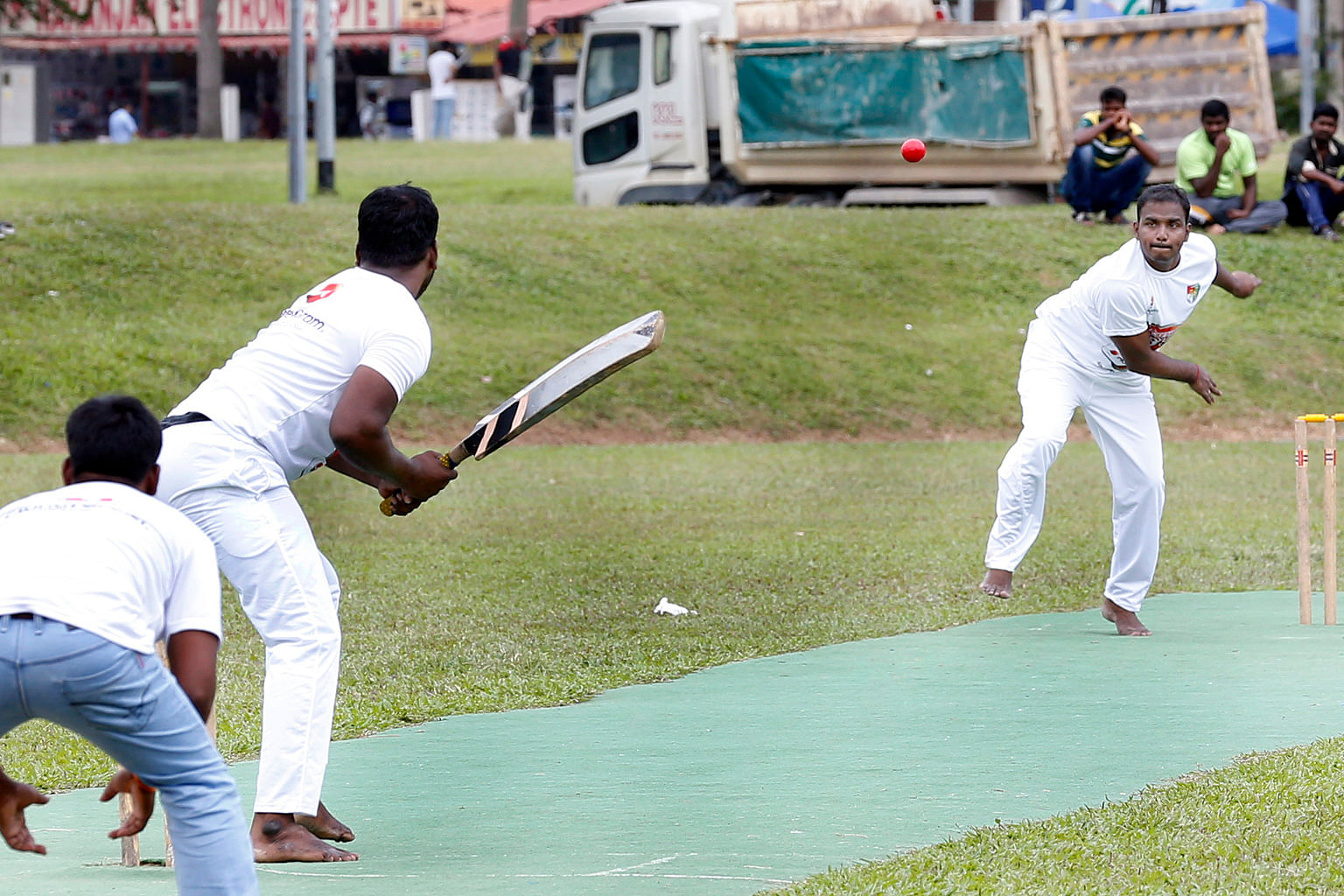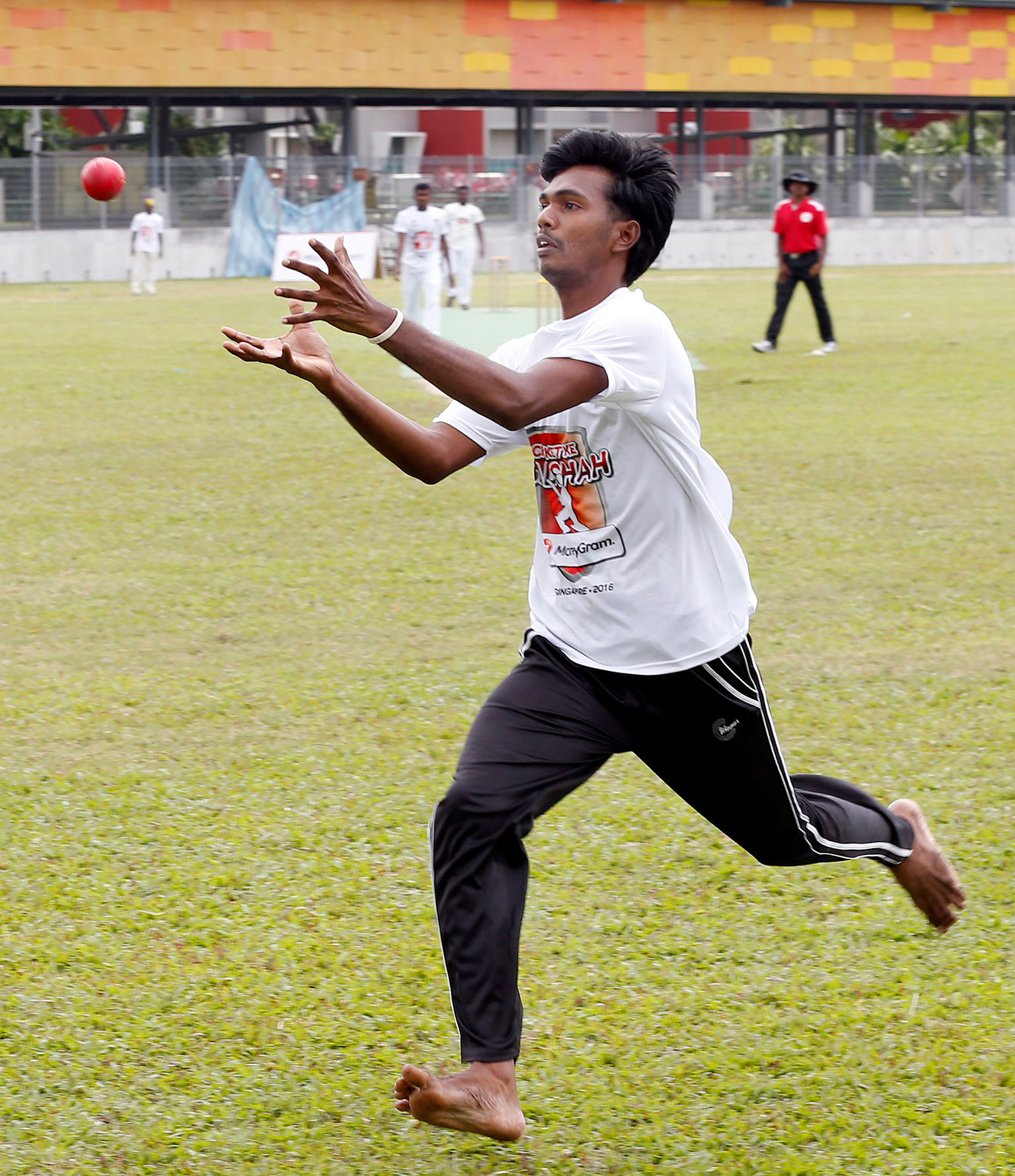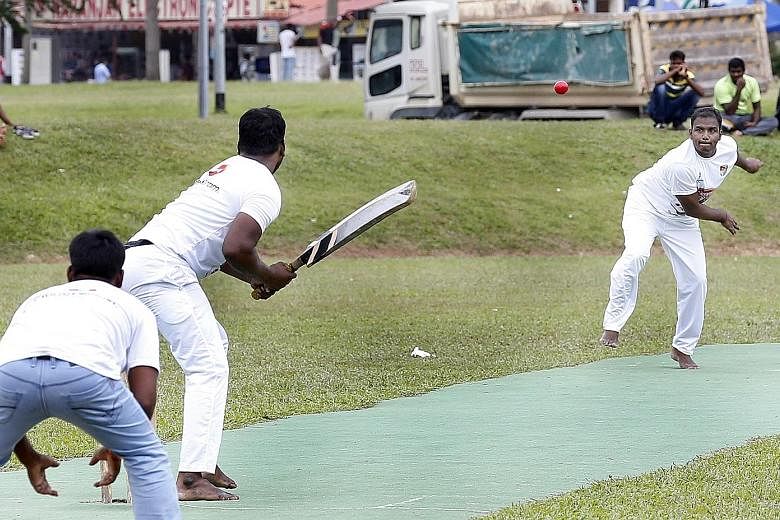Into the afternoon sky a ball flies, a shout goes up, a batsman runs, a scattered crowd watches. It is Sunday afternoon and on a field on Race Course Road an open-air worship has begun. In the distance, two cranes tilt their mechanical necks as if taking a peek. They stand at silent attention because the men who might use them at work are, for this one solitary day of the week, at play.
A. Pandiyaraj, a driver, is here; Mashukur Rahman who works on building ceilings has come, P. Kasinathan, adept at metal framework will not miss it; Muhammad Robin, who deals with air-conditioning ducting, is ready.
Cricket is calling.
For those from the sub-continent who arrive in Singapore to sweat in the sun, lay cement, erect buildings and help build a nation, this is not just a game. It is a childhood recalled and a longing expressed. It is respite, escape, friendship. It is laughter, passion, familiarity.
This Little India field is rich with stories of a game they are delighted by and devoted to. Pandiyaraj, from India, talks of using a sickle to carve a bat from a coconut tree back home and Kasinathan, his compatriot, insists that he might be homesick during work but never during cricket. To say the game flows in their veins seems an exaggeration till R.Vetrivel, a construction engineer from India, says cricket "is like my brother".
All these men are playing an event called Cricket ke Badshah, sponsored by MoneyGram, with the help of the Singapore Cricket Association. Organisers say roughly half the players are construction workers, spread across 50 teams, competing in four-over matches with a rubber ball for a winner's prize of $1,500.

They bowl with untutored actions, swipe violently at the ball, field inelegantly and play with fervour. Some here speak Tamil, some Bengali, but all know cricket's dialect. They work long shifts all week, watch cricket on their phones and then gather on Sunday on patches of Singapore grass to feel Indian and Bangladeshi.

Sometimes they even play in the same team. Through an interpreter, K. Ramesh, an Indian who works at a roller-shutter company, says that Bangladeshi spectators sometimes approach him and ask to play and he accepts for he "sees the sports spirit in them and respects that spirit". When it works, sport can be the most natural of glues.
All of them are foreign workers, and so am I, and on journeys to distant nations we carry - as memory and reassurance - our national clothes, our food, our movies, our language and this game. To be away from a land is to always need a piece of it and like Brazilians and football, these men carry cricket with them overseas as if it were a family heirloom.
They speak of grandfathers as cricket teachers and river banks at home as pitches. C. Balaji, a construction site supervisor from India, says friends back home make bats of teakwood for him and it is how he remembers them. Even when a bat is damaged, he will not throw it away. Some things for the traveller are too precious to let go of.
This game is a contest and yet it has meaning for every participant. It might be as simple as friendship - Ramesh swears he only has "cricket friends" - or as powerful as ambition. Kasinathan wanted to be a full-time cricketer yet his father refused to support the idea. Yet even now this sturdy figure in striped T-shirt, who wants to play for a Singapore club, says: "This is not a hobby, this is not a pastime. This is a serious passion."
These men are hardly missionaries spreading cricket and looking for conversions but they are, merely through the act of playing, keeping a game alive - and themselves as well.
If we, the privileged, speak of stress and the need for leisure, then the six-day worker is even more in need of a field, an open sky and the freedom of sport. As Abir Hasan from Bangladesh says, when he plays cricket there is "no tension". Talking like a man with a neatly logical plan, he calls it "playing for my future life" - cricket means no stress which means good health.
This game can offer opportunity, it creates challenge, it might forge community but in its most elemental sense it is a joyous passing of time. Though for Rahman, from Bangladesh, there doesn't seem to be enough time. He said he would finish his afternoon match, then play another in the evening, return home at 11pm and arise at 5.30am for work.
Soon it will be Sunday again and cricket will call. Family has been left behind across the sea but for these men this game offers a connection to where they come from. In the fresh air they run, a ball is hurled and the stumps are hit. For a while at least it must sound like home.
•Additional reporting by Nicholas Tan


